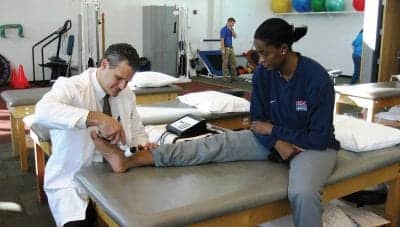by Will Dunham
Last Updated: 2007-09-05 13:00:16 -0400 (Reuters Health)
WASHINGTON (Reuters) – Physicians coming out of medical school with lousy communication skills end up getting more complaints down the road from patients, and tests can find the doctors with problems, according to a study published on Tuesday.
The study confirmed that tests like one given during the medical-licensing process in Canada can predict which doctors would run into trouble and underscored the importance of a doctor’s ability to communicate well with patients.
An example of what one medical school graduate said: "You’ll probably be dead in five months. Make out your will and say goodbye to your children," said Robyn Tamblyn of McGill University in Montreal, quoting the graduate who did poorly on one medical scenario test.
In these tests, administered at the end of medical school, a future doctor is observed handling a medical scenario such as giving a dire diagnosis to a patient played by an actor, and is given a score for how well he or she does.
The researchers looked at 3,424 graduates who took the Medical Council of Canada clinical skills examination between 1993 and 1996 in either Ontario or Quebec.
They tracked complaints made later against these doctors on issues like quality of care, inappropriate medical treatment and physician attitude and deemed valid by medical regulatory authorities.
The lower the test scores, the more complaints were later filed, the study found. And doctors who scored in the bottom quarter in communications skills were particularly likely to attract complaints, Tamblyn’s team reported in the Journal of the American Medical Association.
DISSATISFIED PATIENTS
"Inappropriate or ineffectual communications skills get people into trouble time and time again," Tamblyn said.
Past studies have shown that doctors who communicate poorly are more apt to have dissatisfied patients, more complaints and malpractice suits and poorer patient health outcomes.
The Medical Council of Canada in the 1990s became the world’s first accreditation body to conduct patient-physician communication skills testing in the country’s medical licensing process. Similar communication skills testing began in 2005 in the United States.
The researchers noted that U.S. and Canadian medical school graduates must pass a test on clinical and communication skills. But, they said, until now there was little evidence these tests could predict future problems in medical practice among the doctors who scored poorly on communications skills.
"What this highlights is the importance of paying attention to communications skills from the get-go," Gregory Makoul, who heads Northwestern University’s Center for Communication and Medicine in Illinois, said in a phone interview.
Makoul, who wrote a commentary to go with Tamblyn’s study, stressed that medical schools should pay attention to a future doctor’s communication skills as early as during the initial student admissions process.
Those who scored poorly on the communication tests knew they are being watched and graded, Makoul said.
"You would think that they’re going to be on their best behavior," Makoul said. "If they’re… exhibiting poor interpersonal and communication skills when they know they’re being watched, my guess is that it’s not the first time that they’ve not done well. And it won’t be the last time."




